jueves 18 de agosto de 2011
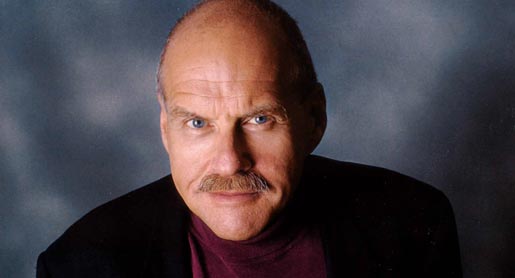
2011 is turning to be a very busy year for Lawrence Block. He brought back Matthew Scudder last May in the brilliant A Drop of the Hard Stuff (Mulholland Books) and next month we’ll be able to put our grubby paws on yet another new book of his: Getting Off (Hard Case Crime). Also, he’s writing a consistently funny and really informative blog, he has released almost all of his backlist as unexpensive eBooks and even joined Twitter. As an avid fan of his fiction I had been looking for quite some time for an excuse to chat with him; now I had three. No more delays, then. I’d like to extend my gratefulness to Mr. Block for his availability and generosity.
Oscar Palmer: Your career sprang from the “Write-for-your-Life” school of the digests and paperbacks, so I’m curious as to how do you see this new era of college courses, literary academies and «How To» manuals (some of which you’ve even authored) as opposed to the world in which you started your career?
Lawrence Block: Well, I feel conflicted. On the one hand, I’ve only read two or three instruction books on writing in my life, and they were all well over fifty year ago. On the other hand, I wrote a monthly column on fiction writing for fourteen years, and have published six books on the subject. I have to believe they’re of some value, yet I certainly made do without them, or their equivalent. And my own background has made me suspicious of MFA graduate programs in writing; I don’t know that they do any harm, but neither am I convinced they do much good, and I think the real danger leads in young people’s belief that they’re necessary. They prepare you to teach writing, but I don’t know that they prepare you to do it. I think one prepares oneself. I came of age when low-level magazine and paperback markets provided a good apprenticeship for writers. I don’t know if there’s an equivalent nowadays, but there may be. I think the Internet and possibilities for self-publishing may constitute a real game-changer. It’s far too early to tell what it may all amount to.
OP: You wrote a great post on your blog about your experience reading John Locke’s How I Sold 1 Million eBooks in 5 Months and how it led you to launch your blog and your twitter account. Also, your use of the Internet as a tool of promoting not just new work but giving a new life to your backlist in the form of eBooks is nothing short of exemplary. How many hours do you usually spend now on cultivating that direct relationship with readers, and in which ways have you altered your work routines to accommodate these new commitments?
LB: Well, I don’t time it. I sit for hours on end at my computer, and I switch from task to task, and lately I use the social media a lot, but I don’t think I’d do it if I didn’t enjoy it. This kind of dialogue with readers is just a different form of what I do in my books, you know. As is this interview. And I should add that I think all of this is counterproductive for those writers who don’t enjoy doing it. If I didn’t get a kick out of this, I’d be doing myself more harm than good.
OP: So, is it working? Have you perceived some renewed interest in your oldest work? Are you satisfied with how things are coming along since you entered the eBook market?
LB: Books of mine that were out of print forever have a new life as eBooks, and people are buying them and reading them and evidently getting some enjoyment out of them. How much that’s going to amount to financially is unknowable at this stage, and it may not really be the point. I’ve always believed that, if people read my books, I’ll make a living. Ultimately, you know, it’s the work that matters. I see writers who network and promote themselves like crazy, but they write books that nobody much wants to read, and while they may get people to try one, they’re not going to build anything lasting that way.
OP: A Drop of the Hard Stuff is your 17th Matthew Scudder novel. Seeing now how the character has evolved and gotten old and changed along the years, what would you say to a new reader of yours in terms of what to expect, not just of this particular novel, but of all the Scudder series?
LB: I probably wouldn’t say anything to the reader, preferring to let the books speak for themselves. As for Scudder’s aging and changing, I never expected that when I began writing about him. Fictional detectives generally stayed the same and never grew older. But the level of realism in the books was such that I felt I had no choice but to let Scudder grow and evolve and age, and I’ve never regretted this decision. The result has been that it may be close to time to stop writing about him, but if he hadn’t evolved I’m sure I’d have stopped long ago.
OP: The hiatus between your previous Scudder novel, All the Flowers Are Dying and A Drop of the Hard Stuff has been the longest between books since you started writing the character. Why it took you so long to get back to him?
LB: Hard to answer. Just as I rarely know what I’m going to write next, neither do I know why I write what I do. In this instance, I thought I was probably through writing the character. Then I thought of the particular premise of the new book, and its setting in an earlier and previously unexamined period of his life, and I was able to write it.
OP: A Drop of the Hard Stuff shares a title with a Dubliners album; When the Sacred Ginmill Closes was named after a line in a Dave Van Ronk song… How important is music to you?
LB: Actually, I don’t know how much of a role music plays. It may have played a larger one in the past than it does now. I don’t listen to anything while I’m working. The last thing I want is distraction.
OP: I’ve loved all of your Hard Case Crime reprints, particularly Grifter’s Game, The Girl With the Long Green Heart and Lucky at Cards, because in them you describe the mechanics of whatever the characters are doing in a way that puts to shame a lot of modern fiction authors, who tend to tell us how great their characters are instead of showing it with actions. Do you research a lot or it’s just that you’re damned convincing?
LB: I don’t do much research. I like to get things right, and the easiest way to do that is to use setting and milieus with which I already have some familiarity.
OP: Your new book, Getting Off: A Novel of Sex & Violence, makes it abundantly clear right up from the cover that this isn’t a Scudder or a light-hearted caper or whatever, and that’s because you received some backlash for some of the content in Small Town, which made me wonder: after more than 50 and very different books, there’s still people who have preconceived notions about how a Lawrence Block book should be, and they get mad about it?
LB: Good question. A lot of my readers seem willing to follow me whatever direction I take, but some have strong preferences. Some like the lighter books, others the darker ones. My feeling is that if I just write what I want to write, if I strive simply to please myself, it’ll work out all right.
Authors • Interviews
Hard Case Crime, Lawrence Block, Noir Sin comentarios
lunes 7 de marzo de 2011

Megan Abbott. Photo by Joshua Gaylord.
Universally hailed as a great stylist and rightful heiress to the greatest masters of hardboiled fiction, Megan Abbott has quickly become one of the most appreciated writers of her generation, deservedly so. And I’m confident that her next novel, The End of Everything (to be released July 7 by Little, Brown), will win her a much broader audience yet, far beyond the limits of noir aficionados already enthralled by her prose. Although there’s no shortage of good interviews with Megan available on the Web, I had a chat recently with her a propos of the Spanish release of her Edgar winner novel, Queenpin, so I thought I’d share it with you.
Oscar Palmer: When and how did you become interested in noir? I’ve read in your blog that you remember seeing Gilda with 9 or 10 years, so I’m guessing this is something that started brewing at a young age. Were your parent fans? Was this encouraged?
Megan Abbott: My parents were fans and very encouraging. They would scour used book stores for me for old movie books and take me to any revival screenings. Everything I write I can trace back to the old movies I watched on TV on Saturday and Sunday mornings. First, it was gangster movies—Public Enemy, especially—and then onto Howard Hawks, Billy Wilder. Somehow, those movies, especially film noir, became the dark foundation for me—they formed the world I wanted to enter, and writing was my way of entering that world.
OP: You’re obviously a great film buff, and I was wondering if you could elaborate a bit about how you think film has permeated your understanding, your expectations and maybe even your literary conception of what noir is. Or should be.
MA: Ah, that’s interesting. It’s true, my first exposure to noir was through film, and only fiction thereafter. For instance, I must have seen Double Indemnity a half-dozen times before I read it, in my 20s. I find them to occupy, generally, separate noir universes and I like to draw from both. There is something very special about the visual resonances film can give noir—bringing to vivid life these shadowy worlds, imparting a glamorous sheen that can make everything seem shinier, more hypnotic, more dangerous. The books, on the other hand, are so much more intimate and the use of first-person in particular (e.g., in Cain, Chandler) brings such intensity, makes everything feel rawer, closer. And, given the Production Code, the books also bring you far closer to the lurid, the unsayable. So these are two different worlds that speak to each other, whisper to each other. I love them both.
 |
|
 |
Queenpin around the world. Spanish edition (cover by Fernando Vicente) and French.
OP: Your first book, The Street Was Mine, was a scholarly essay on noir. Was this something you thought you should do before writing a novel, like a springboard or a laying of the grounds for your own novels?
MA: The Street Was Mine began as my graduate thesis. I had completed my Ph.D. coursework in English and American literature and I wanted to pick something different for my dissertation and I thought I might pursue all those wonderful books that became the basis of my favorite films. I read The Big Sleep and The Postman Always Rings Twice and knew I’d found my passion. I never had any intention of writing fiction, but while working on my thesis, I just needed some non-analytical outlet and found myself writing the pieces of what would become Die a Little, my first book. At first, it was just scraps, a vague idea, but the more I read, the more it fueled it. In writing a critical study, you don’t have as much opportunity to “enjoy your enjoyment” of the books you’re studying, so writing the novel was my way of doing that.
OP: I don’t know if you’ll agree, but I see your novels as some kind of answer to those Chandler and Cain classics you dissected in The Street Was Mine. Not as an antagonistic answer, but more of a parallel approach. Your characters inhabit that same world, but obviously they have a different way of dealing and a different point of view about what’s happening. Anyway, what I wanted to ask is; what did you learn writing The Street Was Mine and what impact did that have in your own prose?
MA: Thank you! I was aware, writing it, that these books were heavily a world of men, and there did seem a ripe opportunity to write these kinds of books with female characters who were not femme fatales (or not viewed as femme fatales and defined solely by their ability to entrap men). So I think that gave me a way in. But primarily reading all these wonderful books just made me want to be a part of their dark fabric. And reading so many in a row, the prose styles, the Manichean logic, the confessional qualities—it just enthralled me and I wanted to try to write like that.
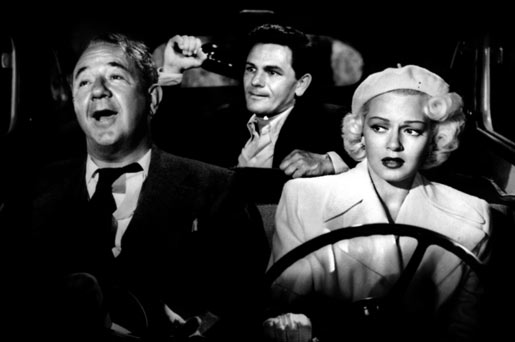
He never saw it coming. Cecil Kellaway, John Garfield, and Lana Turner in
The Postman Always Rings Twice (Tay Garnett, 1946).
OP: Die a Little and Queenpin are set in the 50s. The Song is You in 1949. With Bury Me Deep you went back to the 30s. How big a part of writing these novels went to research? Also, I’m amazed at the seemingly effortless way you have of writing credible vintage dialog and slang. I know authors like David Peace listen to a lot of music, both good and bad, from the time they set their novels on, just to get a sense of which words were used and in which ways, among other things. What kind of sources do you turn to whenever you’re writing a period piece?
MA: I really love research—especially of the less traditional variety. While I will read standard history books, I prefer the more tossed-aside ephemera of the time, which I think can say a lot more about the culture than the so-called “official history.” I’m always trawling flea markets and yard sales for old cookbooks, catalogs, cocktail menus, cocktail napkins, lots of popular magazines and tabloids. Music too—that makes so much sense to me, David Peace’s approach. I listen to a lot of tossaway music, lost jukebox tunes, tin pan alley, novelty songs. I keep absorbing all of it until it becomes this sort of endless collage unfurling in my head. And then I stop, and start writing.
OP: You’ve used characters based on real women in other novels. Was there also any real life inspiration behind the character of Gloria Denton. Have there been, to the best of your knowledge, any real queenpins?
MA: Very few on the kind of scale Gloria works. Gloria is loosely based on Virginia Hill, the paramour of gangster Bugsy Siegel, the one after whom he named the Flamingo Hotel. I learned she was much more than a moll. The mob trusted her to move money and jewels, to go to Switzerland to open bank accounts. She had tremendous power. In 1951, she was called to testify in front of the U.S. Senate and she didn’t give an inch. She told them she didn’t know a thing about organized crime and insisted, “I work where I want and when I want. I don’t dance for nobody.” That line was intoxicating to me. I knew I wanted to bring a character like that to the center. Hill, however, appears to have been a pretty reckless person, and I wanted to make Gloria far more ordered, controlled. In that way, she derives more from, say, film performances of Joan Crawford, or Angelica Huston in The Grifters.
 |
|
 |
Left: The Damned Don’t Cry, in which Joan Crawford played a moll
modeled after the real life Virginia Hill (right).
OP: There have always been female mystery writers, but would you agree that we’re finally seeing an ongoing reinvention of the most male-oriented aspects of the genre, like hardboiled and vengeance yarns, being done by writers such as Christa Faust, Vicki Hendricks and yourself?
MA: I do think we are witnessing a real flood of tougher, darker crime fiction by women and it’s exciting to see it take on a kind of momentum. Of course, it’s been a help in terms of finding readers to be a woman writing in a traditionally male corner of the genre. You stand out. You’re an anomaly. And there’s also fresher terrain in terms of plots. There are still remarkably few noir novels about nurses or female school teachers, for instance!
OP: Name your three favorite film noirs.
MA: Oh, so hard. Today, I go with Double Indemnity, In a Lonely Place and Kiss Me Deadly.
OP: And your three favorite noir novels?
MA: The Long Goodbye, They Shoot Horses, Don’t They, and The Postman Always Rings Twice.
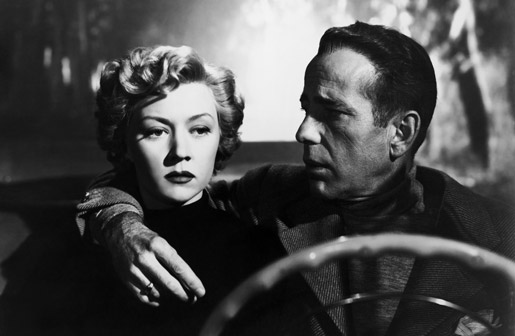
Bogart and the always amazing Goria Grahame find themselves In a Lonely Place (Nicholas Ray, 1950).
Authors • Interviews
Es Pop Ediciones, Megan Abbott, Queenpin Sin comentarios
domingo 25 de abril de 2010
Todd Grimson’s Stainless, one of the best and more unjustly ignored vampire novels ever written, is something of a cult classic that still pops up regularly in blogs and message boards whenever a new reader gets ahold of a copy and gets blown away by its sheer intensity and its raw and bloody romanticism. I recently interviewed Todd à propos of the Spanish release of his novel; finding an interview with him it’s almost impossible even on the Web, so I thought I should post it here in English. Hope somebody enjoys it.
Left: English Cover. Right: Spanish Cover.
Oscar Palmer: It’s been thirteen years since Stainless was originally published. How do you perceive the changes experimented by American pop culture since then, and how do you think Stainless stands against this last wave of defanged and desexed vampires?
Todd Grimson: I haven’t watched any of the new vampire fare. So maybe it’s better than I think. Though not from what I hear. I thought to myself at the time that Stainless basically ended the genre, that it was the last and the greatest vampire novel ever. It sounds absurd, but I don’t mind sounding absurd.
OP: There’s vampires in Stainless and zombies in Brand New Cherry Flavor. What did using both of these pop horror icons allowed you as a writer?
TG: I started out (BNCF was written first) trying to organize what I accomplished sometimes in my short fiction… trying to work the “waking dream” quality I thought I occasionally achieved… into the longer form. I developed the idea of what I then saw as “cinematic realism.” This has an obvious relation to “magical realism” – at its most basic, you might call it Life + Special Effects. Given that our modern imaginations have been so infected by the language and vocabulary of film, and that my own dreams are vivid and cinematic, this all seemed to make sense. Stainless originated in a dream; as I worked on the novel the original vision was reinforced by other dreams making use of the images obsessing me by then.
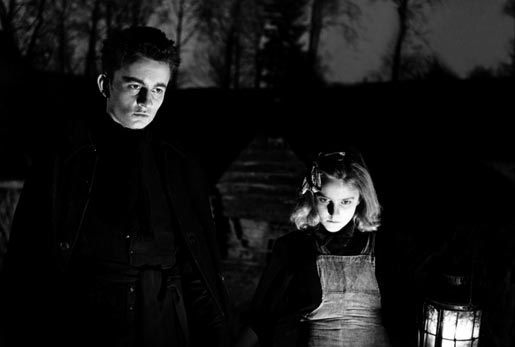
Robert Bresson’s Diary of a Country Priest.
OP: Were you deliberately attempting to redefine or deepen vampire lore, or was this just a mean to an end, a good way of giving an edge to what could have otherwise been a simple love story?
TG: I wanted to write the Final, Ultimate Vampire Novel. I read all that was out there, brooded for a month. Anne Rice in Interview With a Vampire has three vampires living in early 19th century New Orleans, each supposedly killing one person each – every night. That’s over a thousand corpses a year when the population of that city was much less than today. And no one notices?! I thought this was ridiculous, and, worse than ridiculous, uninteresting. How much blood would one need per day? I have worked in a surgical intensive care unit, I was and am intimately familiar with blood and death. What if the vampire avoided the obvious bitemark on the throat, possessed some mild hypnotic power, was not as strong as a superhero, and only took enough blood to live? Say a bowl of soup’s worth? The bitten would most often survive. I discussed the possible issues with a physician I knew. There is a medical condition which requires frequent transfusions, another in which a patient may be hypersensitive to the ultraviolet light of the sun. It’s been postulated that the accumulation of “heavy water” in the body is what causes aging and eventual death, Maybe a disease might have a side-effect which is positive, perhaps something offbeat in the spleen or the thyroid reregulating the organism? It’s not completely impossible. It may not be likely, but for my purposes such hypotheses at least moved us closer to something real. There is minimal if any invocation of supernatural power in this book. Justine can be killed. And you do not instantaneously die when her teeth touch your neck. Rattlesnake venom is not even so fast as that.
OP: You use quite a lot of characters and situations for such a short novel, creating almost a mosaic of narratives. Some of them, like the fifties episode with the police detective or the shooting of the vampire movie in 1969 almost seem like complete short stories. Was this hard to manage without losing sight of the main storyline? And was this fragmentation always part of your original plan or did it grow as you went along?
TG: I didn’t want Justine to have 400 year old eyes. There’s no vulnerability in that, no capacity for some survival of the child within. Justine is fragile in some ways, and this also makes her more sexy. She suffers from some amnesia. The past is like a dream. It’s also important that she believes in God. When you believe in God you experience it much more acutely if you come to believe you are damned. The flashback scenes showed us to some extent a different Justine. I mimicked the language and mood of Poe, then for 1950s Los Angeles I used some heightened notion of the James Ellroy one finds in The Black Dahlia. The 1960s scene is the Pynchon of V. and my memories of such films as The Trip — gone cruel.
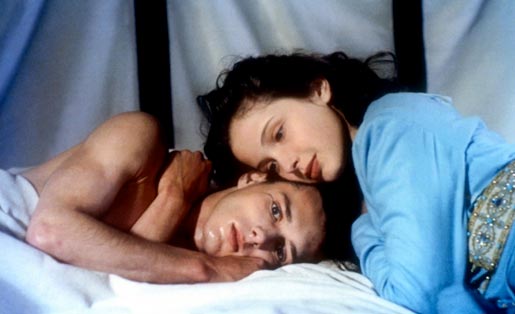
Bertrand Tavernier’s The Passion of Beatrice, starring Julie Delpy.
OP: Your writing in Stainless is very sparse but oddly poetic. Did you have to labour a lot to get this balance?
TG: I only sought to be precise. I don’t think my prose tends in general to be “purple” – I’m not a big fan of the author showing off. That sort of prose comes between the reader and the nudity of what is being shown.
OP: How important was to you that Keith should be a musician? And why? I love that he thinks a lot about sounds, and the way he wishes to play just one infinite note stroke me as very genuine.
TG: I have played a lot of music myself. I played the piano. I once gave piano recitals, and also was in a band. Then I suffered nerve damage to my left hand. So this all came from experience. Keith’s injured hands… I felt I knew what that was like. And meanwhile, I usually write with headphones on, listening to something very loud…and then I have no memory of what it is I have heard.
OP: It seems to me as if Stainless is now like a time capsule of the nineties, not because is dated in any way but because it encapsulates perfectly a time and a place. I don’t know whether you’ll agree with that perception at all, but I’d like to know what were you seeing around you at the moment of writing, that led you or inspired you to create the ambiance that permeates the novel.
TG: I wrote it right after Brand New Cherry Flavor, which is more satirical, less emotional. It seemed like a continuation of that novel in some ways. Some of my friends became heroin addicts, so I suppose that influenced me, just because it was all around. I’ve scored drugs with more experienced junkies. Once I committed myself to the project and saw this as a milieu that I could live in, the goth kids and so on just fell into place out of all those I saw or knew. But I wasn’t trying to make a grand statement about the times. I was always, always, asking myself “Does this make sense?” And I was trying to really understand Justine, who is not a modern young woman. To that end I immersed myself in Georges Bernanos’ novel Diary of a Country Priest (and the film made of this by Robert Bresson), and I watched Bertrand Tavernier’s The Passion of Beatrice easily more than one hundred times. The last sixteen minutes of that film portrays a mysterious, perfect ritual that moved me every time, often to actual tears. And then I would write, after the close-up of her face when she is lost, she realizes she is forever damned.
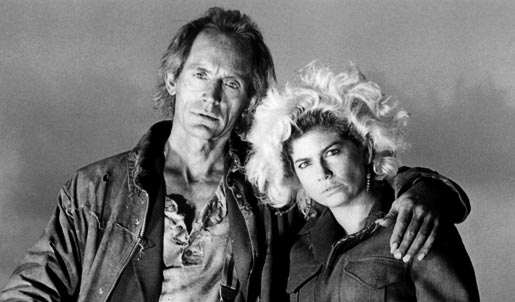
Lance Henriksen and Jennette Goldstein in Near Dark.
OP: If I’m not mistaken, you did sell the film rights for Stainless, but as far as I know, nothing came of that. Did Hollywood screw you as anybody else?
TG: Lise Raven, an independent filmmaker, wrote a treatment, and kept trying for several years. The big studios all kept saying they each had their own vampire film in development. Lise Raven – and my Hollywood agent, Lisa Callamaro, would say “But wait, this would be the ultimate, this gives you everything and anything you’ve ever thought you might get from the vampire mythos!” I still hope there might be a film, both because I hope such a film might be great – and because a film might bring more people to read the book. Sigourney Weaver and 20th Century Fox took an option on Brand New Cherry Flavor, which gave me more money – but would probably be a much more difficult film to make. Stainless is right there. Just use the dialog in the book. There’s no need for expensive CGI. Use unknowns and keep it simple and direct.
OP: Since we’re talking about film, name your three favorite vampire movies
TG: Near Dark; Count Yorga, Vampire; Bram Stoker’s Dracula (w/Gary Oldman).
- If you live in a country where Spotify is licensed, be sure to check this selection of tunes handpicked by Todd as the perfect soundtrack for Stainless.
Authors • Interviews
Es Pop Ediciones, Stainless, Todd Grimson Sin comentarios

















